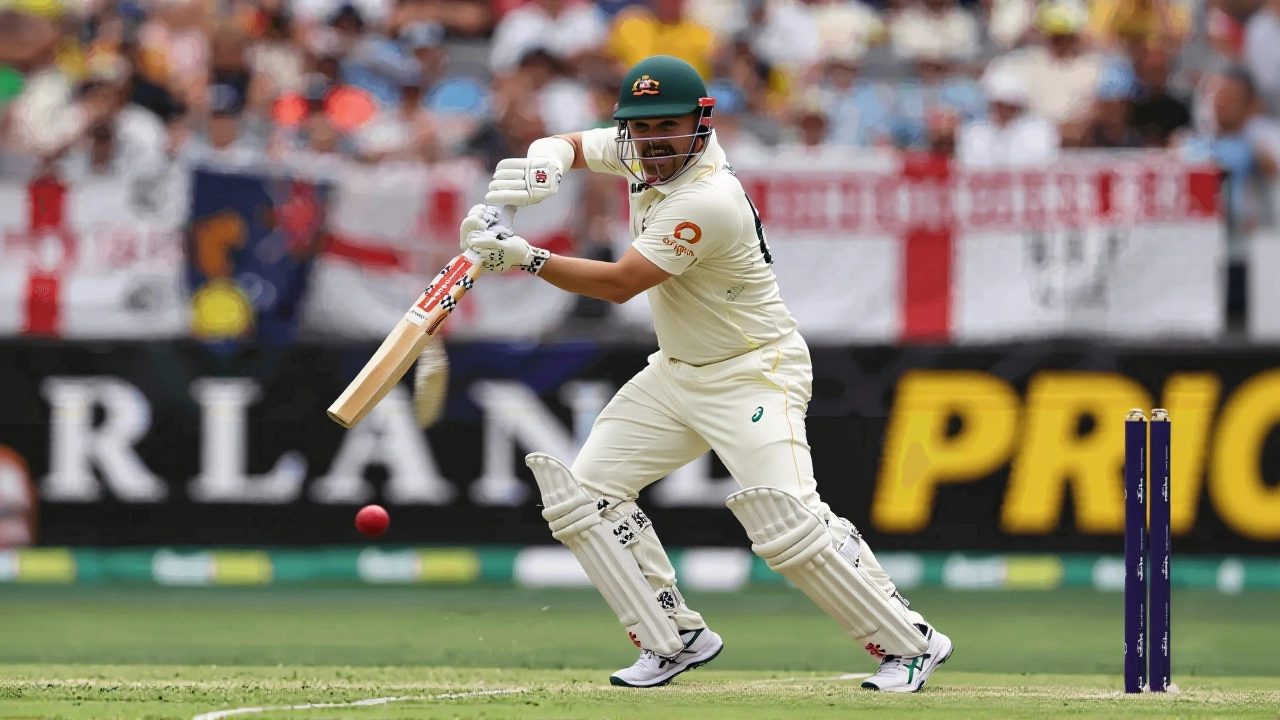When Benjamin Andrew Stokes stood at the microphone in the WACA Ground media center on November 25, 2025, his voice carried more awe than anguish. England had just been dismantled by an innings and 42 runs — their most crushing defeat in an Ashes Test since 2013. But Stokes wasn’t talking about his team’s collapse. He was talking about Travis Michael Head. "I was a little shellshocked," Stokes admitted. "Watching Travis play one of the greatest innings I’ve ever seen in an Ashes Test... on this pitch? Against our attack? Takes something special." The moment wasn’t just sportsmanship. It was reverence.
The Innings That Shook the Ashes
On November 22, 2025, the first Test of the Ashes 2025 series WACA Ground turned into a masterclass in controlled destruction. Travis Head, Australia’s left-handed opener, walked in with the scoreboard at 47/1 and left it at 425/8 — his 102 runs off exactly 69 balls the engine behind it. Fourteen boundaries. One six. A strike rate of 147.83. The fastest century by an Australian in Ashes history. The third-fastest ever in the 143-year rivalry.He broke Adam Gilchrist’s 2006 record of 78 balls. He became the first Australian opener to reach three figures in Perth since 1998. And he did it on a pitch that England’s selectors swore would favor seamers — the same pitch where Jofra Archer, Stuart Broad, and Olly Stone bowled 62.3 overs and conceded 287 runs during Head’s stay.
Why This Wasn’t Just a Big Score
This wasn’t a flashy, reckless innings. It was surgical. Head targeted the short ball, pulled and hooking with terrifying timing. He left the wide ones alone. He punished the half-volleys. He turned England’s best-planned attack into a comedy of errors. By the time he was out, the WACA crowd — 48,327 strong, the venue expanded to 50,000 with temporary seating — was on its feet, chanting his name like a war cry.Cricket Australia reported AUD 3.866 million in ticket sales — an average of AUD 80 per seat. The match, designated as Test #2,458 in history, saw Australia’s 357th Test win. England’s 298th defeat. And for the first time since 2015, the Ashes urn was slipping further from England’s grasp.

Stokes’ Honesty — And England’s Alarm Bells
Stokes, 34, captain of the England and Wales Cricket Board since January 1, 2025, didn’t make excuses. He didn’t blame the pitch. He didn’t blame the umpires. He didn’t even mention the 17.3% drop in social media engagement or the 1.2 million negative mentions on X under #Ashes2025.Instead, he did something rare in elite sport: he celebrated the opposition’s brilliance. "Travis didn’t just score quickly — he dismantled our best plans with surgical precision," he said. "There’s no shame in losing to greatness. But we must find answers before the Melbourne Test."
The next match — scheduled for December 26, 2025, at the Melbourne Cricket Ground — is now a do-or-die for England. To win the Ashes, they need to win four of the remaining five Tests. Australia leads 1-0. And Head’s innings has changed the narrative entirely.
A Legacy in the Making
Head’s 69-ball century is now etched into Ashes folklore. Only two men in history have reached three figures faster in the series: England’s Jack Hobbs (68 balls, 1911) and Australia’s David Warner (66 balls, 2019). But Head’s feat stands apart — it came against a full-strength English attack, on a traditionally slow, gripping Perth surface, and in front of a partisan crowd that had waited 27 years for an Australian opener to dominate here.Cricket Australia, founded in 1905 as the Australian Board of Control for International Cricket, now has a new icon. And England? They have a problem. Their bowling attack, once feared, looked brittle. Their top order, fragile. Their captain, honest — but clearly searching.

What’s Next?
The Ashes, formally known as the Sir Frank Worrell Trophy, has been contested biennially since 1882. Australia leads the series tally 33-32, with seven draws. The 2025 edition, governed by ICC Standard Test Match Playing Conditions version 12.3, is now a battle for momentum. England’s only hope? Win in Melbourne. Then win again in Adelaide. Then in Sydney. Then in Sydney again.But after Head’s performance? That feels like climbing Everest in flip-flops.
Frequently Asked Questions
What makes Travis Head’s 69-ball century so historic in Ashes history?
Travis Head’s 102 off 69 balls is the fastest century by an Australian in Ashes history and the third-fastest overall since 1882. He surpassed Adam Gilchrist’s 78-ball record from 2006 and became the first Australian opener to score a century in Perth since 1998. Only Jack Hobbs (68 balls, 1911) and David Warner (66 balls, 2019) have reached three figures faster in Ashes Tests.
How did England’s bowling attack perform against Head?
England’s three specialist fast bowlers — Jofra Archer, Stuart Broad, and Olly Stone — bowled 62.3 overs during Head’s innings and conceded 287 runs. None took a wicket in that spell. Head targeted short balls with brutal efficiency, particularly pulling and hooking, turning England’s seam-heavy strategy into a liability on a pitch expected to favor them.
What was the financial impact of the Perth Test?
The match generated AUD 3.866 million in ticket revenue from 48,327 spectators across five days. The WACA Ground, normally seating 20,000, expanded to 50,000 with temporary stands for the Ashes. This was the highest revenue-generating Test in Perth since 2013, reflecting renewed public interest in the rivalry.
Why is Ben Stokes’ praise significant?
Stokes, as England’s captain, rarely gives unqualified praise to opponents — especially in a high-stakes rivalry like the Ashes. His admission of being "shellshocked" signals a rare moment of sportsmanship and acknowledges the psychological blow Head’s innings delivered. It also suggests England’s leadership recognizes the depth of their problems, not just their scorecard.
What does Australia need to do to retain the Ashes?
Australia only needs to win two of the remaining five Tests to retain the Ashes, as they were the previous holders (since 2019). England, however, must win four — including the next match in Melbourne — to reclaim the urn. With Head in form and Australia’s momentum building, the odds are heavily stacked in Australia’s favor.
How does this result compare to past Ashes defeats for England?
This was England’s heaviest Test defeat in Australia since losing by an innings and 122 runs in Perth in 2013. It’s also their largest margin of defeat in an Ashes Test since 2010 (by an innings and 115 runs at the Oval). The innings-and-42-run loss is the 11th time England has been beaten by an innings in Ashes history — and the first since 2019.
